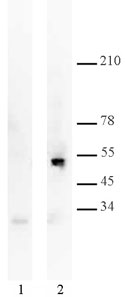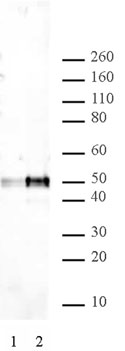p53 antibody (mAb) (Clone DO1)
Host / Isotype
Mouse / IgG
Reactivity
Human
Applications
ChIP, IP, WB
CloneNo.
DO1
Cat No : 39553,39554 39553
Synonyms
Validation Data Gallery
Product Information
| Tested Applications |
ChIP, IP, WB
Applications Validated by Active Motif: IP: 5 ug per IP WB: 0.5 - 2 ug/ml dilution This antibody is also available as an AbFlex engineered recombinant antibody. For details on the corresponding AbFlex Recombinant Antibody, see Catalog No. 91247. |
| Tested Reactivity | Human |
| Host / Isotype | Mouse / IgG |
| Class | Monoclonal |
| Type | Antibody |
| Immunogen | This p53 antibody was raised against full-length recombinant human p53 protein. |
| Full Name | p53 antibody (mAb) (Clone DO1) |
| Synonyms | p53, p 53, clone DO1, DO1, mAb, monoclonal, clone DO1, antibody, antibodies, sample, dbdabs |
| Molecular weight | 53 kDa |
| GenBank accession number | NP_000537 |
| RRID | AB_2793254 |
| Purification Method | Protein G Chromatography |
| Buffer | Purified IgG in 70 mM Tris (pH 8), 105 mM NaCl, 31 mM glycine, 0.07 mM EDTA, 30% glycerol and 0.035% sodium azide. Sodium azide is highly toxic. |
| Storage | Some products may be shipped at room temperature. This will not affect their stability or performance. Avoid repeated freeze/thaw cycles by aliquoting items into single-use fractions for storage at -20°C for up to 2 years. Keep all reagents on ice when not in storage. |
Background Information
p53 is the most important tumor suppressor in the genome. It is responsive to numerous genotoxic stresses, which activates its transcription factor activity, in turn causing cell-cycle arrest by activating expression of p21 Cip/WAF. Mutant p53 that has lost its DNA-binding function interferes with the activity of native p53 and leads to oncogenic transformation. Alternatively, transformation may be caused by overexpression of Mdm2/Hdm2, a ubiquitin ligase specific for p53, which causes its destabilization. Inactivation of p53 is often coincident with hyperactivation of NFkB (NFkB p50 and NFkB p65), both of which serve to inhibit apoptosis.


